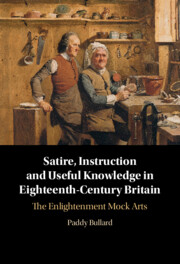
-
Select format
-
- Publisher:
- Cambridge University Press
- Publication date:
- April 2025
- May 2025
- ISBN:
- 9781009460477
- 9781009460521
- Creative Commons:
-
This content is Open Access and distributed under the terms of the Creative Commons Attribution licence CC-BY-NC 4.0.
https://creativecommons.org/creativelicenses - Dimensions:
- (229 x 152 mm)
- Weight & Pages:
- 0.55kg, 278 Pages
- Dimensions:
- Weight & Pages:
Open AccessYou have access to this book
Book description
Long before the Industrial Revolution was deplored by the Romantics or documented by the Victorians, eighteenth-century British writers were thinking deeply about the function of literature in an age of invention. They understood the significance of 'how-to' knowledge and mechanical expertise to their contemporaries. Their own framing of this knowledge, however, was invariably satirical, critical, and oblique. While others compiled encyclopaedias and manuals, they wrote 'mock arts'. This satirical sub-genre shaped (among other works) Swift's Gulliver's Travels, Sterne's Tristram Shandy, and Edgeworth's Belinda. Eighteenth-century satirists and poets submitted to a general paradox: the nature of human skilfulness obliged them to write in an indirect and unpractical way about the practical world. As a result, their explorations of mechanical expertise eschewed useable descriptions of the mechanical trades. They wrote instead a long and peculiar line of books that took apart the very idea of an instructional literature: the Enlightenment Mock Arts.
Reviews
‘Bullard has written what will become the how-to of how-to satire in the long eighteenth century. This is a thrilling and instructive read which invites us to think differently about the texts presented here through the lens of the mock arts.'
Helen Williams - Associate Professor of English Literature, Northumbria University
‘Satire, Instruction and Useful Knowledge in Eighteenth-Century Britain is an original, percipient, and admirably wide-ranging approach to its subject: the paradox of eighteenth-century writing about practical skills that seem to defy written description. Bullard's erudite and engaging study explores connections between literary technique, cognition, and haptic epistemologies as ambivalent responses to the Industrial Enlightenment.'
Nicholas Seager - Professor of English Literature, Keele University
Contents
-
Frontmatter
pp i-iv -
-
- You have access
- Open access
- Export citation
-
-
Contents
pp v-v -
-
- You have access
- Open access
- Export citation
-
-
Acknowledgements
pp vi-vii -
-
- You have access
- Open access
- Export citation
-
-
Abbreviations
pp viii-xx -
-
- You have access
- Open access
- Export citation
-
-
Chapter 1 - Introduction
pp 1-28 - Enlightenment Mock Arts and Industrial Enlightenment
-
-
- You have access
- Open access
- Export citation
-
-
Chapter 2 - Daedalus and Proteus
pp 29-50 - Satire and Useful Knowledge in Seventeenth-Century England
-
-
- You have access
- Open access
- Export citation
-
-
Chapter 3 - The Scriblerian Mock Arts
pp 51-83 - Eighteenth-Century Satires of Didacticism
-
-
- You have access
- Open access
- Export citation
-
-
Chapter 4 - Anthropologies of the Mechanical Arts
pp 84-108 - Robinson Crusoe and Gulliver’s Travels
-
-
- You have access
- Open access
- Export citation
-
-
Chapter 5 - Ingenuity, Industry, Experience
pp 109-134 - Eighteenth-Century Georgic
-
-
- You have access
- Open access
- Export citation
-
-
Chapter 6 - Manuals of Mock Arts
pp 135-168 - The Art of Ingeniously Tormenting and Tristram Shandy
-
-
- You have access
- Open access
- Export citation
-
-
Chapter 7 - The Art of Teaching to Invent
pp 169-198 - Maria Edgeworth and the Lunar Society
-
-
- You have access
- Open access
- Export citation
-
-
Notes
pp 199-252 -
-
- You have access
- Open access
- Export citation
-
-
Index
pp 253-258 -
-
- You have access
- Open access
- Export citation
-
Metrics
Full text views
Full text views help Loading metrics...
Loading metrics...
* Views captured on Cambridge Core between #date#. This data will be updated every 24 hours.
Usage data cannot currently be displayed.
Accessibility standard: Unknown
Why this information is here
This section outlines the accessibility features of this content - including support for screen readers, full keyboard navigation and high-contrast display options. This may not be relevant for you.
Accessibility Information
Accessibility compliance for the PDF of this book is currently unknown and may be updated in the future.

